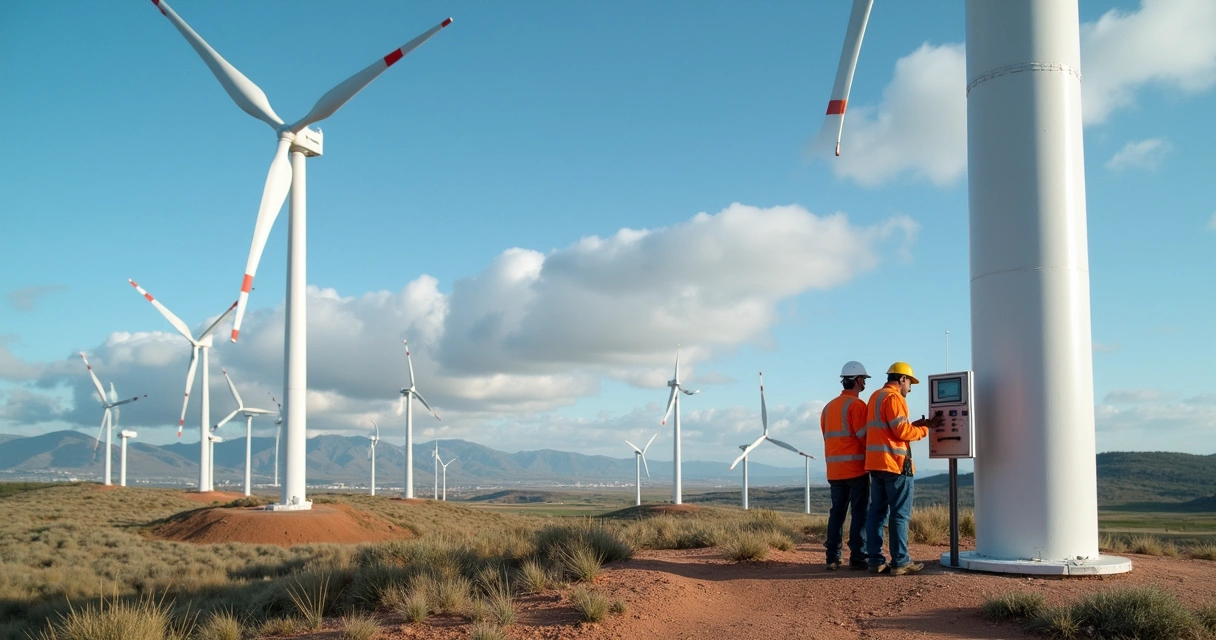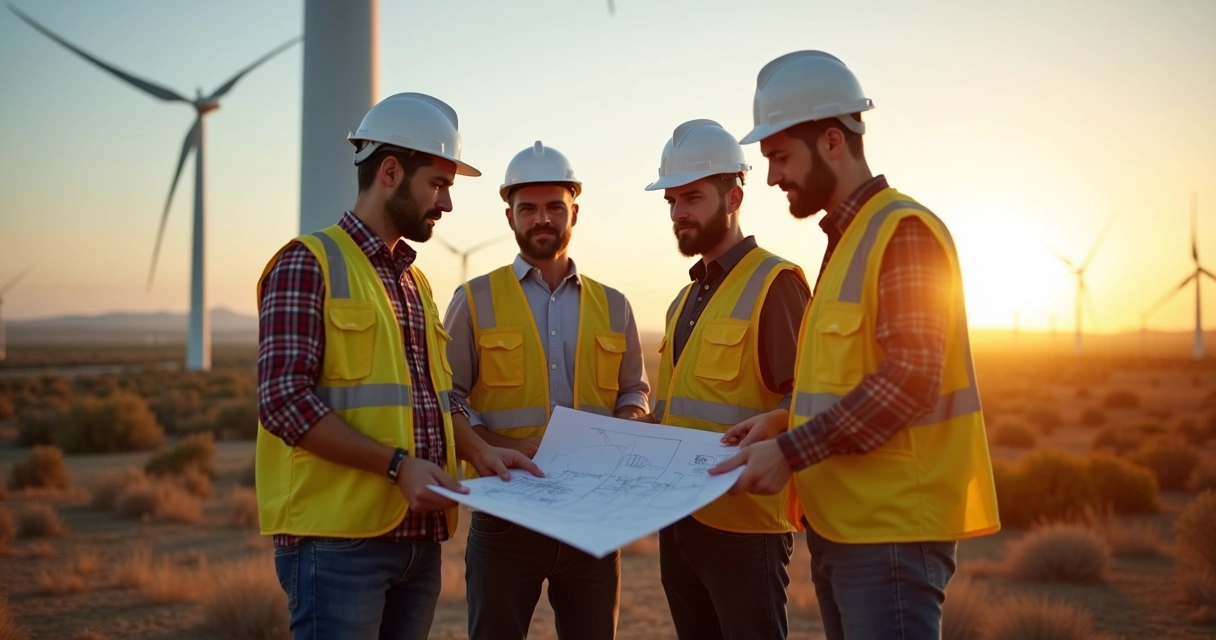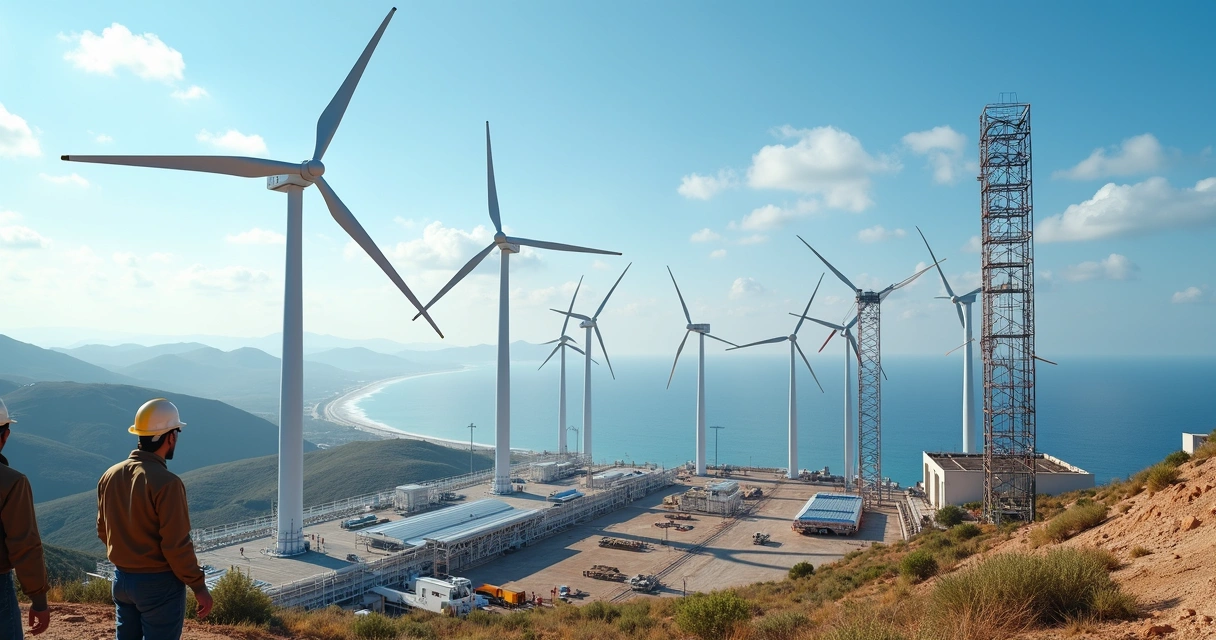Whenever I look at the crosswinds between global industry trends and the day-to-day needs of technical teams on the ground, I see stories that rarely get told. Chinese wind turbine suppliers trying to build or serve wind farms in Spain, for example, need more than just logistics or strategy—they need boots on the ground. And every boot arrives with a thick folder of legal, payroll, and HR variables stuck to its sole.
In the past few years, I’ve come to appreciate the unpredictable road from hiring in China to field deployments in Southern Europe. It’s the kind of task that always looks deceptively simple until suddenly, it’s not. That’s where EWS steps in—taking on the intricacies most international suppliers would rather not dwell on.
Let’s set the stage: the wind sector in Spain isn’t just growing—it’s booming. According to GWEC supply-side data for 2024, Chinese wind turbine manufacturers are leading global installations. They now install tens of gigawatts annually, with their market share climbing rapidly in Europe. Spain is now a central hub for wind power growth, pushing both domestic and international manufacturers to think differently about staffing and field operations.
 In 2024, global wind turbine installations reached 127 GW.
In 2024, global wind turbine installations reached 127 GW.These numbers don’t just mean contracts, factories, and market share. They mean hundreds of technicians who need to be on-site—sometimes tomorrow, often for months, sometimes moving between projects as fast as the wind itself.
As European wind turbine nacelle production centers continue to cluster in Spain, Germany, Denmark, and neighboring countries (GWEC Global Wind Report), Chinese suppliers face a big question: How to deploy skilled Chinese or local technicians in Spain—without getting tangled in red tape?
Before I get into what EWS does for Chinese wind turbine suppliers, I think it’s wise to acknowledge just how the sausage is made in Spain. Most companies assume that “hiring” is just about finding the right engineer or installer and handing them a contract. In practice, for non-Spanish entities, it’s a web.
There’s payroll, sure, but also:
Each of these isn’t just a checkbox—they can become project-killers if mishandled.In Spain, even a “small” error on payroll or contract registration can result in months of delays, fines, and reputational headaches. In my experience, global managers can underestimate these barriers until it’s almost too late.
This backdrop is exactly why I’ve seen EWS’s approach get traction. I want to share, step by step, how EWS typically helps a Chinese wind turbine supplier succeed in hiring technicians in Spain. It isn’t magic. It’s method, experience, and sometimes sheer persistence.
The starting point is always clarity. Most Chinese suppliers approach EWS either at the deal negotiation stage, or as soon as it becomes clear that Spanish boots on the ground will be needed. The first step is a one-on-one needs assessment. What will the technicians be doing? For how long? Which regions of Spain? What skills, what languages, what risk appetite, what budget structure?
From there, EWS draws up a tailored framework. This framework doesn’t just map out how many people to hire or what to pay them. It sets the legal and compliance roadmap, built specifically for each client’s field operation. This is when EWS draws on its multi-country experience and explains, in simple terms, “If you want to work in this region, you’ll need A, B, and C, with these specific forms or employment structures.”
At this point, I think most suppliers run into a fork in the road. Traditionally, hiring in Spain would mean forming a local subsidiary, which can be laborious and time-consuming. For Chinese wind suppliers moving quickly, a nimble solution is needed. That’s where EWS’s Spain Employer of Record (EOR) service fits in.
An EOR acts as the legal employer on behalf of the Chinese supplier, handling compliance, payroll, and HR obligations—without requiring the supplier to open a Spanish company. EWS allows suppliers to sidestep weeks or months of company formation, letting them focus instead on technical onboarding and site preparation. And if a local entity becomes necessary for long-term projects, EWS guides that process too.
Legal friction melts away when you work with experience.
Sometimes, Chinese wind suppliers want to send their own specialist technicians from China; more often, they need to hire locally in Spain or Europe for practical or regulatory reasons. EWS taps its deep network to source skilled wind field technicians, with screening that goes beyond CVs and reference checks.
 The candidates are evaluated not just for hard skills—like troubleshooting, installation, and safety compliance—but also for the softer abilities:
The candidates are evaluated not just for hard skills—like troubleshooting, installation, and safety compliance—but also for the softer abilities:
When the right talent is found, EWS manages all employment offer letters, contracts, and required onboarding documentation in compliance with local law. This includes social security registrations and work permits when a non-EU national is involved.
If there’s a single point where most overseas deployments stumble, it’s payroll and taxes. Spain’s employment regulations are strict and inflexible: withhold the wrong amount one month, miss a payment by a day, or use an outdated social security calculation, and you’re liable for fines. EWS shields suppliers from these pitfalls through a multi-currency, fully compliant payroll outsourcing platform.
This payroll expertise connects with another EWS service—Employer of Record for China—for suppliers operating across both countries, ensuring a smoother bridge between EUR and RMB salary flows.
Strict European labor mobility rules can block even the best-planned field rollout. While the European Union tries to streamline talent mobility, Spain still requires careful navigation for non-EU staff. EWS works through:
 It can feel endless. In reality, it’s often a series of manageable steps—provided someone actually does the chasing, troubleshooting, and translation. EWS lifts this administrative weight from both global HR teams and on-site supervisors.
It can feel endless. In reality, it’s often a series of manageable steps—provided someone actually does the chasing, troubleshooting, and translation. EWS lifts this administrative weight from both global HR teams and on-site supervisors.
Working at heights on wind turbines is more than just technical. Spain enforces strict health and safety regulations, much of it requiring up-to-date certifications that may not transfer directly from China. EWS coordinates:
No field work starts without safety. Not anywhere. Not ever.
If you’re a global mobility manager or HR director with dozens of technicians across several Spanish sites, the task can feel overwhelming. But, honestly, the peace of mind from knowing someone is triple-checking your risk exposure—especially when Spanish regulations meet fast-paced Asian projects—is hard to overstate.
Hiring a single technician is a challenge; ramping up or down for rotating teams of 15, 50, or more is a different kind of stress. EWS structures contracts and payroll to allow for:
Companies can scale operations in Spain without long-term commitments—or overhead—by adjusting technical headcount as needed. This flexibility is one of the main reasons I see Chinese suppliers opt for partners like EWS over traditional labor agencies or permanent hiring schemes.
A few months ago, I tracked the story of Chinese group Zhenshi, now investing up to €270 million to build a fiberglass wind turbine plant in Puerto Real, Cádiz. The sheer scale of investment (more here) shocked local observers: four hundred new jobs, cutting-edge components, and a push for supply chain resilience.

Hiring in Morocco: North Africa’s Emerging Tech Talent Market
Hiring in Portugal: What You Need to Know in 2026
Global Mobility and EOR: How to Align HR and Immigration in 2026
Beyond China: Where Asian Companies Are Hiring in 2026
How Recruiters Use EOR to Win Big in Fintech Placements
Europe’s Freelancer Laws in 2026: When to Switch to EOR
Hiring in the Philippines: 2026 Guide for Global Employers
How Recruiters Use EOR to Unlock German Healthcare Placements
Hiring in Colombia: 2026 Compliance Guide for LatAm Expansion
Hiring in Türkiye (Turkey): 2026 Guide for International Teams
How Recruiters Use EOR to Handle Rapid Global Onboarding
Top 5 EOR Red Flags to Avoid in 2026
EOR vs Entity Setup in 2026: What Startups Need to Know
10 Things You Didn’t Know Your EOR Could Do
When to Use a Payroll Provider vs Full EOR in Global Hiring
January Compliance Watch: What’s Changing in APAC Labor Laws
Hiring in Turkey in 2026: Costs, Contracts, and EOR Options
Contractor or Employee? Compliance Risks to Watch in 2026
What’s Changing in European Payroll Compliance in 2026?
How to Use EOR to Win More Government or Public Sector RFPs
Hiring in Colombia: Fast-Growing Talent Pool, Low Total Cost
Remote Tech Jobs Surge 33% in Ireland: Skills You Need Now
Remote Work in APAC: 7 Data-Driven Trends for 2026 Expansion
Remote Payroll Headaches: 7 Mistakes HR Teams Make
Freelancer vs EOR in 2026: Cost, Risk, and Speed Compared
How Employee Experience Drives Retention and Business Growth
How HR Can Reduce Burnout Amid AI, Budget Cuts, and Change
Employment Contracts: What HR and Global Managers Must Know
PEO Explained: How It Simplifies Global Workforce Management
Global Mobility: A Complete Guide for HR and Global Managers
Remote Workforce: A Complete Guide to Managing Global Teams
Workforce Planning: A Step-by-Step Guide to Strategic Hiring
How Recruiters Use EOR to Increase Revenue Per Client
The Secret to Winning Global RFPs? A Strong EOR Partner
Top 7 Hiring Trends Shaping Global Teams in 2026
Hiring in Türkiye: Key Labor Laws and Employer Risks in 2026
GCC Hiring Compliance Update: What’s Changing in 2026
How to Hire in Turkey in 2026: A Strategic EOR Guide
Why modern recruitment agencies outsource compliance to EOR partners
How adding an EOR partner helps agencies win more RFPs
EOR Opportunities in Poland: Why It’s Europe’s Talent Powerhouse
Cross-Border Hiring Trends for 2026: Insights for Global Recruiters
How to Build a Scalable Payroll Strategy Across MENA
Contractor vs Employee in Germany: What’s the Risk in 2026?
“Place globally, bill locally” — the new recruiter cheat code
Top 5 Compliance Mistakes When Expanding to the UAE
Why EOR is Key to Winning Public Sector Tenders in Europe
Growth formula for agencies using EOR to expand key accounts
How EOR helps recruiters stay ahead of fast-changing GCC compliance
Employer of Record in Mandarin: What is 境外雇主服务?
How to Use an EOR for Temporary Projects (中国公司如何为短期海外项目使用EOR服务)
Why “Go Global” Must Include Compliance (“走出去”战略中的合规盲点)
中资企业如何选择欧洲EOR供应商?(How to Choose the Right EOR Partner in Europe)
与当地政府打交道:中国公司需要了解的合规礼仪 (Cultural Compliance for Chinese Firms)
中国公司海外人力结构案例分析:制造业、科技与能源 (HR Case Studies: Chinese Firms Abroad)
How Guanxi Influences Hiring in the Middle East (关系在中东招聘中的作用)
Top 5 Risks When Hiring in the Gulf (中国企业在海湾地区招聘的五大风险)
Managing Compliance in Multi-country Projects (中国企业多国项目的人力合规管理)
The $100K Visa Shock: Why Global Hiring Just Replaced the H-1B
How to Set Up Payroll For Hpc And Ai Teams
Contracting Machine Learning Talent Abroad
Everything on Hiring Foreign Phds In German Tech Labs
Cross-Border Ip Protection In R&D Teams
How To Classify Freelancers In Tech Innovation
How Eor Helps Tech Firms Legally Hire In Germany
Dual Contract Structure For International Researchers
Data Protection Obligations For Remote Tech Staff
Germany Research Visa Vs Skilled Worker Visa
Everything on Nis2 Directive Compliance For Eu Tech Workers
Global Mobility For Deep Tech Startups In Germany
Payroll For EU Embedded Systems Developers
Relocation Support For Semiconductor Experts on EU
The Absolute Way to Hire Ai Engineers In Germany
How to Manage Benefits For German Tech Hires
Germany’S Blue Card Process For Engineers
Everything on Germany R&D Employment Compliance
Remote Hiring Of Cybersecurity Analysts In Eu
Visa Pathways For Quantum Computing Researchers
Onboarding Robotics Specialists Across EU Borders
Workforce Planning In Ai-Driven Logistics And Infrastructure
Visa Processing For High-Tech Infrastructure Staff
Managing Global Mobility In Sustainable City Projects
Cross-Border Team Management In Saudi Data Centers
Hiring Skilled Labor For Green Hydrogen Facilities
Digital Twin Technology Hiring Trends In Saudi Construction
Employer Obligations In Public-Private Energy Initiatives
Navigating Local Labor Laws For Solar Energy Teams
Talent Acquisition In The Saudi Mining Sector
Eor Solutions For Ai Engineers In Mega Projects
Regulatory Challenges In Hiring For Giga Construction Projects
Contractor Compliance In Smart City Developments
Classification Of Engineering Consultants In Vision 2030 Projects
How To Manage Workforce For Neom-Based Tech Projects
Eor For Multinational Mining Firms Operating In Saudi Arabia
Employer Of Record For Wind Energy Projects In The Gulf
Relocation Logistics For International Clean Energy Experts
Hiring Strategies For Large-Scale Construction Projects In Ksa
How To Onboard Digital Infrastructure Experts In Saudi Arabia
Payroll Setup For Renewable Energy Workers In Ksa
Strategic Relocation To Riyadh Or Doha: A Guide for Global Employers
Work Visa Processing In Qatar And Saudi Arabia
Qatar Nationalization Policy And Foreign Firms
Cost Of Setting Up A Business In Qatar: A Guide for Global Employers
Saudi Labor Court And Dispute Handling for Global Employers
Cross-Border Payroll For Ksa And Qatar Teams
End Of Service Benefits Saudi Arabia: A Guide for Global Employers
How To Manage Expat Benefits In Qatar for Global Employers
Expanding Into New Markets: Vendor Risks You Should Flag
A Guide to Cross-Border Equity Vesting for Tech Startups
Employer Branding for Multinational Teams: What Works Now
What Global C-Level Leaders Miss About Digital Nomad Visas
Succession Planning for Distributed Teams: A Practical Guide
Relocation Budgeting For Global Tech Firms
Latam Hiring Strategy: What Global Companies Should Know
Risk Of Permanent Establishment Explained
Managing Intellectual Property In Remote Work
Benefits Benchmarking Globally for Global Companies
How to Benchmark Compensation Across 100+ Countries in 2025
Checklist: Preparing HRIS for Fast International Scalability
Biometric Data in Global Payroll: Legal Boundaries Explained
8 Regulatory Updates Impacting Global HR in 2025
What are Hidden Costs of In-House Payroll?
Why Companies are Thinking Differently About Relocation
Is Your Global Mobility Program Outgrowing Spreadsheets?
Remote Work Visas: A Growing Trend in Global Mobility
Hiring in Europe Post-Brexit: What You Need to Know
Tips for Managing Multi-Time Zone Teams Successfully
Relocation Packages: What Top Talent Expects in 2025
Banking and Payroll Challenges in Saudi Arabia Markets
The Legal Risks of Misclassifying Global Workers
Why Scalability Should Drive Your Global HR Strategy
How EWS Streamlines Global Mobility for Tech Talent
Lithuania – Employer of Record
Kosovo – Employer of Record
Finland – Employer of Record
Namibia – Employer of Record
Nepal – Employer of Record
Spain – Employer of Record
Latvia – Employer of Record
Ireland – Employer of Record
Cyprus – Employer of Record
Czech Republic – Employer of Record
Italy – Employer of Record
Indonesia – Employer of Record
South Africa – Employer of Record
Tunisia – Employer of Record
Bosnia – Employer of Record
Moldova – Employer of Record
Five Tips For Improving Employee Engagement
Netherlands – Employer of Record
Germany – Employer of Record
France – Employer of Record
Portugal – Employer of Record
Bulgaria – Employer of Record
Austria – Employer of Record
Hungary – Employer of Record
Slovenia – Employer of Record
INCLUSIVITY IN THE TEAM MAKES EVERYONE WIN
Thailand – Employer of Record
Sri Lanka – Employer of Record
The Significance of an Employer of Record
Greece – Employer of Record
Mexico – Employer of Record
4 Reasons to Outsource Your Payroll
Five Recruitment Trends 2023
Malaysia – Employer of Record
Skill-Based Hiring and Benefits
Malta – Employer of Record
How To Practice Inclusive Recruitment
Israel – Employer of Record
Macedonia – Employer of Record
Jordan – Employer of Record
Macau – Employer of Record
Peru – Employer of Record
The Importance of Employer Branding
Bahrain – Employer of Record
South Korea – Employer of Record
Recruiting during a recession
Philippines – Employer of Record
USA – Employer of Record
Japan – Employer of Record
How To Setup A Business in 2023
Norway – Employer of Record
Managing Overseas Projects In 2023
Reason Of Expanding Your Workforce Globally
Croatia – Employer of Record
Colombia – Employer of Record
5 Ways To Speed Up Your Hiring Process
Egypt – Employer of Record
3 Ways To Streamline An Interview Process
Russia – Employer of Record
Saudi Arabia – Employer of Record
Hong Kong – Employer of Record
An Effective Hybrid Work Model
Turkey – Employer of Record
UAE – Employer of Record
Pakistan – Employer of Record
7 Things to Consider Before Accepting a Job
Kazakhstan – Employer of Record
3 Reasons to Encourage Employees to Generate Employer Brand Content
Denmark – Employer of Record
Sweden – Employer of Record
Bangladesh – Employer of Record
Kuwait – Employer of Record
How To Hire In The Age Of Hybrid Working
Australia – Employer of Record
Oman – Employer of Record
Qatar – Employer of Record
Ukraine – Employer of Record
Diversity – A Vital Hiring Strategy
Owning Every Moment of Your Hiring Experience
Serbia – Employer of Record
Maldives – Employer of Record
India – Employer of Record
Argentina – Employer of Record
Uzbekistan – Employer of Record
Belarus – Employer of Record
Brazil – Employer of Record
Chile – Employer of Record
Armenia – Employer of Record
3 Steps To Company Formation In The UK & Abroad
Romania – Employer of Record
Canada – Employer of Record
Morocco – Employer of Record